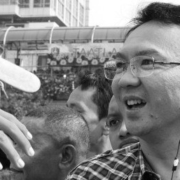During the New Order period, there were allegations that China was actually behind the Indonesian Communist Party’s alleged coup attempt on 30 September 1965. In the chaos that followed, anti-China and anti-Chinese sentiments erupted. Diplomatic ties between China and Indonesia were severed in 1967 and were only officially re-established in 1990. Meanwhile, Indonesia’s ethnic Chinese population was caught in the middle. They were viewed as communist sympathisers and had their national loyalties questioned.
So much is still unknown about China-Indonesia relations during the Cold War, and in particular China’s role in the pivotal events of 30 September 1965. How did Chinese and Indonesian actors contribute to the diplomatic and political dynamics of the time? How did transnational ethnic ties and the daily social and political practices of the ethnic Chinese influence state-to-state diplomacy?
In Talking Indonesia this week, I speak to Dr Taomo Zhou, an assistant professor at Nanyang Technological University, Singapore. Taomo’s new book, Migration in the Time of Revolution: China, Indonesia and the Cold War (Cornell University Press, 2019), examines the nature of China’s involvements in the immediate period leading up to 30 September 1965.
In 2019, the Talking Indonesia podcast is co-hosted by Dr Charlotte Setijadi from Singapore Management University, Dr Dave McRae from the University of Melbourne’s Asia Institute, Dr Jemma Purdey from Monash University and the Australia-Indonesia Centre, and Dr Dirk Tomsa from La Trobe University.
Look out for a new Talking Indonesia podcast every fortnight. Catch up on previous episodes here, subscribe via iTunes or listen via your favourite podcasting app.










